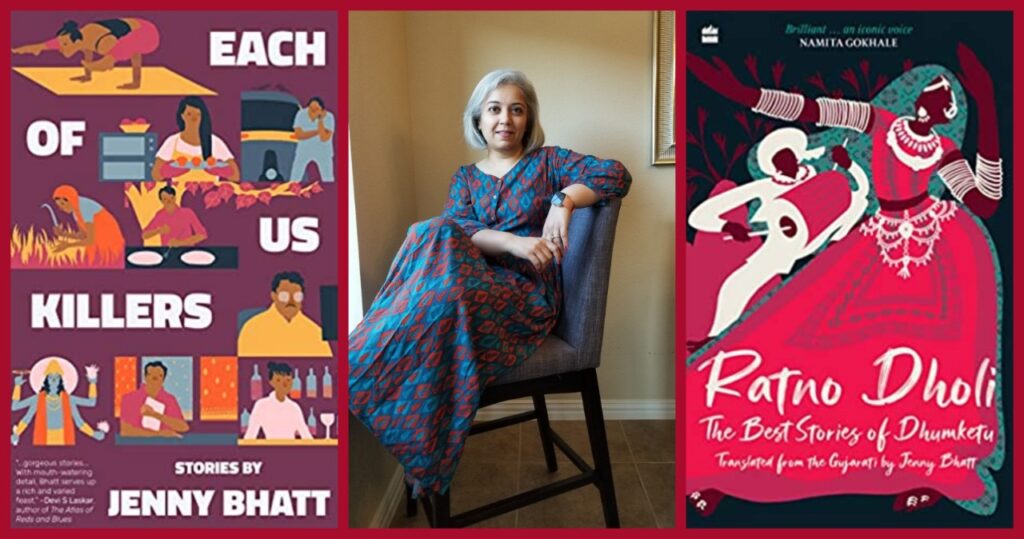India is a country of vast cultural and varied heritage, and literature is no exception. Legendary authors of numerous Indian languages are an integral part of this culture. While they are iconic in their own regard, the world needs to explore their fabulous works, and the translation is probably the only solution. One of the foremost personalities working tirelessly to make Indian and South Asian literature accessible is Jenny Bhatt. The Texas-based literary expert recently translated short stories of celebrated Gujarati author, Gaurishankar Govardhanram Joshi, popularly known as Dhumketu, titled Ratno Dholi. Our team had a chance to interview Jenny, and here’s what she had to say:
What inspired you to translate Dhumketu’s works?
I grew up listening to my mother talk about and share stories from her favorite Gujarati writers’ works. She was a huge lover of literature, especially Gujarati literature. Dhumketu was among her favorites. Before she passed away in 2014, we had briefly discussed collaborating on a translation project together. But, unfortunately, that didn’t happen. When I inherited her small personal library, Dhumketu’s books dominated the collection. I knew I had to honor her memory (and Dhumketu’s legacy) by translating some of his stories. Initially, the project was only intended for my family. But a literary agent persuaded me to consider a book-length work for publication.
How important is it to introduce classical Indian writers like Dhumketu, Premchand, etc. to the English-reading audience?
Anglophone readers in India and beyond have a lot of choices. There are so many amazing writers of South Asian origin or in South Asia writing now. (By the way, I focus on “South Asia” versus “India” because we have so much rich, shared history, both ancient and contemporary, across the South Asia region.) However, when we speak of regional language classics written by the likes of Dhumketu, Premchand, Chugtai, Manto, and many others, we are talking about books that are now historical, literary, and cultural artifacts. Translating them for today’s readers helps all of us understand our cultures, histories, and literature better. Experiencing these diverse literary traditions is about more than an aesthetic appreciation of their storytelling. It’s about a sense of belonging to a larger literary landscape and understanding how all of these literary traditions continue to influence writers across South Asia and even its diaspora today.
Translation is a difficult task, especially translating the legendary author. What were the challenges you encountered while translating Dhumketu’s stories?
The biggest challenge, with Dhumketu’s short stories, was ensuring that his beautifully rhythmic and colloquial Gujarati did not lose its flavor when translated into English. Of course, it’s not possible to transpose everything from one language into another seamlessly. Some things will, as they say, be lost in translation. But there’s a lot to be gained as well. So, I aimed to stay true to the writer’s intention and make the language accessible for today’s readers.
What was more difficult? Writing Each of Us Killers or translating for Ratno Dholi?
For me, both forms have their own challenges and rewards. With my own collection, I had set myself specific goals, both in terms of storytelling and craft, for each story. Translating Dhumketu’s stories, I wanted to ensure I captured his intentions fully and didn’t lose the flavor of his language. That said, being a short story writer myself helped me understand and appreciate Dhumketu’s craft and techniques. And being a translator helped me be more particular in my own choice of words and phrases in my own writing. So these are different but complementary creative skills.
How was your experience working with HarperCollins India?
I have had a great experience working with the editors there. Rahul Soni is a translator himself so he understands the work. And Prema Govindan, with whom I worked on a more day-to-day basis, is such a thorough editor and ideal reader — she asked many great questions that helped me edit and refine the entire translation better than I could have done on my own. They’ve made me a better translator. And, while I still have a lot of learning to do because translation is both an art and a craft that must be honed through practice, I will always be grateful to HarperCollins India (and my literary agent, Kanishka Gupta, who took the proposal to them) for this first book. They also have a terrific marketing team so I’ve appreciated working with Prateek Agarwal and Arcopol Choudhury too.
The demand for translations from Indian languages is not as much as they deserve, which is quite a sad thing. What, according to you, is the reason for this? What can the industry do to change this?
There are two related issues. First, the demand for translations, in general, is low across the world. Things have improved in the last decade or so but translated books are still a very small percent of what major publishers take on. There are many reasons for this and smarter people than me are working to address it, especially independent publishers. I believe the Indian publishing ecosystem is somewhat healthier with respect to translations in comparison to other countries. We see major literary awards in India including translated works in their longlists, shortlists, and winners. More than anything, demand is generated by discerning readers. If we all, as readers, ask for and uplift more translated works, publishers will definitely respond to that demand. We will then see such books get the attention they rightly deserve.
Tell us about your podcast, Desi Books.
Desi Books began in April 2020, right after the pandemic-driven lockdown began. A lot of writer friends who had books coming out this year were despairing about not being able to launch their books properly due to the lockdown. Major media venues were also tightening their freelance budgets so reviews and interviews were getting scarce. With two books of my own out this year, I knew just how that felt. So, I started the podcast as a way to spotlight new and notable books by writers of South Asian origin or from South Asia.
We’re about 20 episodes in and have featured more than 40 writers and their works now. I’ve discovered many amazing books and writers myself so I’m grateful for that. The press coverage and listener feedback has also been lovely. And it’s been personally rewarding to put some of this positive energy out into the world at a time when we could all use that to counter all the negativity.
India is a country with a massive English-speaking population. However, publishers still struggle to find book readers, except for, perhaps, commercial fiction. What do you think is stopping the publishing industry from growing as it should?
Hmm. This is an age-old problem, I think, but it’s more visible now because we’re all so active on 24/7 social media. Reading is one of those solitary activities that requires undivided attention and we’re not able to do that as easily these days with so many online distractions. I’ve always said that reading is, like any other exercise, about a regular discipline and practice. And we need to be careful about what we “consume” as readers just as we’re careful about what we “consume” as eaters because our reading matter affects our intellectual and emotional health. As you see, I always come back to what readers could do versus what publishing folks could do. The onus of making us read more cannot be on some external forces. That motivation has to come from within.
Being a teacher, what advice would you like to give an aspiring writer who might be reading this on her/his smartphone in a remote Indian village?
That’s a great question. And a very tricky one. If they’re an aspiring writer, they need to be writing. They need to develop writing as a muscle, a regular practice and discipline. And, if they can, they need to read widely and diversely using that smartphone because reading is an essential part of growing as a writer.

Noman Shaikh is the co-founder and editor-in-chief of Bombay Reads. He grew up in Mumbai, a city he loves more than any other, and currently works as a content consultant. His expertise lies in creating high-quality academic and marketing content in the form of blogs, articles, op-eds, etc. Noman has worked with reputed brands, including Economic Times (through Spiral Media), Coinbase (through MattsenKumar), AdEngage, Della Group, GBIM Technologies, VAP Group, etc. For his published portfolio, click here. Contact Noman on noman@bombayreads for engagement.


Pingback: ‘Each of Us Killers’ on SPD Fiction Bestseller List - Bombay Reads